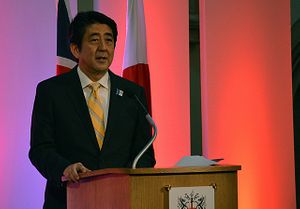The debate over the makeup of Japanese Prime Minister Shinzo Abe’s next Cabinet is beginning to intensify, with the reshuffle planned for the first week in September. As the first reconfiguration of the Cabinet since Abe came to office, the number of changes is expected to be large, with perhaps only three members keeping their current positions out of 18, and the possibility of two new Cabinet posts. Abe must seek to satisfy both the factions within his own party and his junior coalition partner New Komeito, while also delivering on policy promises related to the change in collective self-defense, Abenomics and the possible inclusion of more women in the Cabinet. However, the question that could have the largest impact on Abe’s rule may be what to do with LDP Secretary-General Shigeru Ishiba.
At this point, government sources who spoke with the Yomiuri Shimbun have said that only Chief Cabinet Secretary Yoshihide Suga, Deputy Prime Minister and Finance Minister Taro Aso, and the minister in charge of economic revitalization, Akira Amari, will retain their positions, as each is in charge of ongoing tasks Abe has deemed vital to the administration. In contrast, Abe is expected to replace all three LDP Cabinet-level party officials; two of whom are women and the other is Ishiba. Replacing the two women could be problematic, as Abe has stated he wants to increase the percentage of women in leadership, both in his government and throughout Japanese society. Currently there are only 40 women among the LDP’s 410 parliamentarians, and there have been complaints from other Cabinet members that women with less experience may be assigned over men in the party who have waited at least five terms to join the government’s highest level of leadership.
Abe will also have to contend with New Komeito’s demands, as sources told the Jiji Press on Tuesday that the junior partner will ask him to retain Transportation Minister Akihiro Ota in his current position. There has been no indication that the prime minister will grant the request, however the Jiji Press speculates that Abe will do so here as New Komeito is guaranteed one post in the government, and Ota’s personal ties to Abe as well as his position as the No. 2 person in New Komeito make him a strong candidate to return.
Aside from the normal worries of maintaining policy course during a transition, Abe must also contend with different factions and power struggles within the LDP. The largest right now concerns Ishiba and whether he will remain the LDP’s secretary general, or fill the new Cabinet post for national security that Abe is likely to create. That post will oversee what is expected to be a difficult course for new legislation relating to collective self-defense that will be introduced both in the fall and spring Diet sessions. Government sources have said that Abe wants Ishiba to fill this position because he has in the past served in security related positions, including defense secretary, and so he expects Ishiba to be able to carry this legislation through what is likely to be a difficult debate with opposition parties.
Ishiba has served as secretary general for two years, which is long by LDP standards. He has said “There are people other than me who are suitable for the post of the security minister,” and there are indications he wants to stay as general secretary through the unified elections next spring so as to have a better chance at the LDP presidency later on. However, aides for Ishiba question Abe’s motives, “If [Ishiba] joins the Cabinet, he will be unable to act freely. The appointment as security minister is the prime minister’s plot to contain Mr. Ishiba’s actions, so that he will not be able to run in next year’s LDP presidential election.” Abe is the current party president, but must step down next September. The same government sources say Abe is highly unlikely to offer Ishiba any other position in the government, so declining the security affairs post could leave him out of the leadership altogether.
Abe appears to be making a shrewd move. Ishiba certainly has the experience for the new security post, which Abe will need even though his ruling coalition has a majority in both houses of the Diet because the public backlash is likely to be severe. Instead of building support over the next year to take over the LDP’s presidency, Ishiba could end up taking the brunt, or at least some of the public’s dissatisfaction with the new collective self-defense interpretation. Even if Ishida doesn’t absorb some of the public backlash, Abe will have kept a formidable politician from replacing him as president, and possibly challenging his overall leadership later on.

































